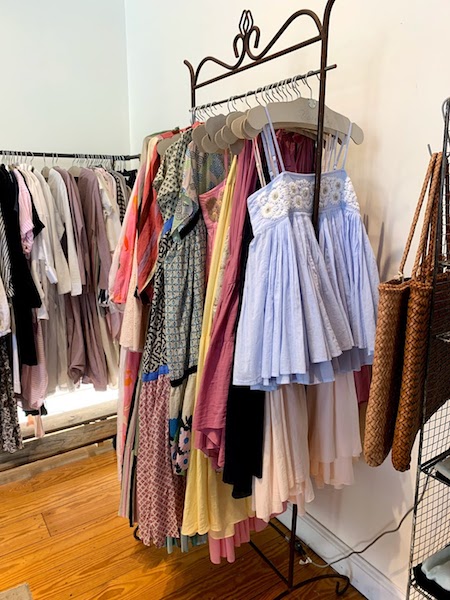Verdalina: A Staple in the Arts District Fashion Scene
Retail Spotlight
By: Emma North
“I love to look at the inside of clothes and see everything so beautifully finished,” said Deborah Boschen, owner of the clothing store Verdalina. “This is just the stuff that excites me… I love something like this that’s crisp, and classic.”
Verdalina owner, Deborah Boschen shows off a dress from a Japanese designer.
As Deborah Boschen holds up and explains her current favorite piece of clothing from her store you can tell that not only does she have valuable fashion experience but she also has a passion for the clothes she is selling.
Every piece inside of Verdalina has been carefully curated by Boschen and her team to present a clean and calming aesthetic that still is shockingly beautiful. With a variety of clothing ranging from simple and clean pieces made with linens and cotton to stunning sequined dresses, Verdalina has an undeniable wow-factor.
Formal dresses like this one can also be found at Verdalina.
Boschen has been working in retail for over 30-years and her store Verdalina has been her passion for the last six years. Verdalina is a boutique clothing store located at the corner of Broad Street and North Monroe Street in the Richmond Arts District.
She was bit by the fashion bug when she was living in Los Angeles in 1980 and all of her business adventures since have been inspired by the emergence of small boutiques on Melrose Avenue. “I loved the idea of a speciality boutique that was intimate in that way as opposed to going into a department store,” said Boschen.
Upon moving back to Richmond, Boschen met Suzanne Hammes, the manager of The Pink Cadillac, a women’s clothing and gift boutique in Carytown. Together they began to plan the opening of their own women’s clothing store. When Hammes went to resign from The Pink Cadillac the owner offered to sell his store to them and they jumped on the offer. This was 1987. Hammes, Boschen’s original business partner, sold her share to Libby Sykes in 1992 and together Boschen and Sykes changed the name to Pink and continued to grow their business out of that location. Over the 25 years Boschen was running Pink she witnessed Cary Street become Carytown and also see her style grow and evolve. After leaving Pink, Boschen set her sights on a new emerging neighborhood for her next project. “I didn’t want to be back in Carytown because that felt like going backwards in a way,” said Boschen.
When Verdalina opened in the Arts District almost six years ago, most of the activity was coming from the art galleries in the neighborhood. Similar to her experience in Carytown, the neighborhood has really evolved over time. “It was fun to be part of Carytown’s growth and I thought this would be the same,” said Boschen. And it has happened, retail has moved in, lots of restaurants have moved in, and I found this beautiful corner space with lots of light.”
In addition to clothes there are a number of different accessories available for purchase.
Boschen created her store for a particular type of customer. Verdalina has been designed to fit a more mature woman and represents Boschen’s personal style and needs. Her ideal customer is typically older than 40. “She still looks good and wants to dress fashionable but she has different needs than when she was younger like she wants her arms covered she wants her legs covered,” said Boschen. She allows her personal taste to guide her as she goes to market, and looks for pieces to sell in her store. Boschen’s closet is entirely composed of clothing from Verdalina.
Verdalina carries clothes from designers in the U.S, Japan, and Europe.
In addition to her own instincts she works with her team to determine what she carries and always keeps her best customers in mind. Verdalina’s customers are given Boschen’s cell phone number and she keeps them updated with texts and pictures on new things coming into the store. She wants all of her customers to love what they buy and love wearing it. When she goes to market, to purchase clothing for the store she always keeps the needs of her regular customers in mind.
Verdalina is not a store that follows trends but instead focuses on high quality and a “slow fashion” model.
Fast fashion is cheap and rapidly produced clothing for mass production while slow fashion focuses on high quality goods that last. Slow fashion is a more sustainable production model and also allows designers to work directly with manufacturers.
Verdalina is currently stocked with plenty of options for warm weather.
Boschen really became aware of the stark contrasts between fast and slow fashion six years ago when she visited an H&M for the first time. She had come across a completely lined and tailored jacket being sold for $29 while her completely lined and tailored jackets at Pink were being sold at around $450. “I knew there was a problem, someone wasn’t getting paid and I figured of course it has to be the workers. It shocked me because I had never witnessed that or gone into those stores.”
The clothing sold at Verdalina all comes from sustainably sourced brands. “I like clothes that are designed well, made well with the best textiles and built to last,” Boschen said. “They’re not throw-away clothes or landfill clothes.”






